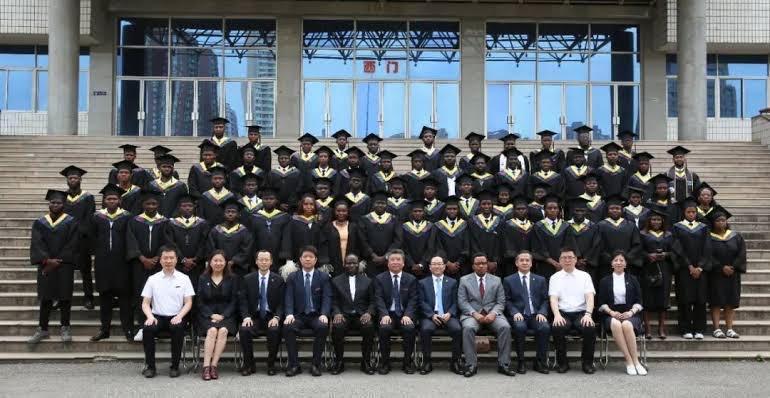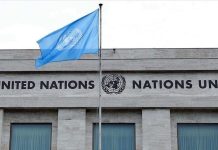Africa-Press – Eritrea. As the Forum on China-Africa Cooperation (FOCAC) marks its 25th anniversary, one of its most powerful legacies is becoming increasingly clear: job creation. In just the last three years, Chinese enterprises have created over 1.1 million new jobs across Africa, a bold step in the continent’s ongoing fight against poverty. Chiemelie Ezeobi writes that this milestone underscores a growing economic partnership that is not only reshaping and redefining trade and infrastructure but also transforming lives through employment, skills development, and long-term investment in local capacity
As the Forum on China-Africa Cooperation (FOCAC) marks its 25th anniversary, few statistics better reflect its impact than this: over the past three years alone, Chinese enterprises have created more than 1.1 million new jobs across Africa. It is a figure that speaks not only to economic cooperation but to a model of poverty alleviation that is quietly reshaping the lives of millions on the continent.
The milestone was unveiled by Chinese Foreign Minister Wang Yi during the 2025 Two Sessions parliamentary meetings in Beijing, where he described China-Africa ties as now enjoying their “best moment in history.” The relationship, he said, had matured into an “all-weather” strategic partnership with concrete outcomes in trade, infrastructure and livelihoods.
“The China-Africa cooperation has earned widespread acclaim for its tangible and substantive outcomes,” Wang told a world press briefing. “In the past three years alone, Chinese enterprises created more than 1.1 million new jobs in Africa.”
For a continent where unemployment, especially among the youth, remains a defining challenge, the importance of these figures cannot be overstated. From road and rail construction to agriculture, ICT, and manufacturing, Chinese investments are fuelling labour-intensive industries that give everyday Africans a pathway out of poverty.
A History of Tangible Cooperation
Since its launch in 2000, FOCAC has served as the main platform guiding China-Africa cooperation. Over two and a half decades, it has delivered a stream of developmental projects, from highways to power plants, ports, and hospitals. But as the partnership matures, job creation has emerged as a defining focus.
According to Chinese Customs data, bilateral trade between China and Africa reached 2.1 trillion RMB (approximately $280 billion) in 2024, a 6.1 per cent year-on-year increase and a 24-fold jump since FOCAC began. For the 16th consecutive year, China remains Africa’s largest trading partner.
Behind the trade figures, however, is the human story of livelihoods secured, skills acquired, and opportunities born from Chinese investments on African soil.
In Nigeria, China Civil Engineering Construction Corporation (CCECC), a major contractor in railway infrastructure, employed at least 4,000 Nigerians during the construction of the Abuja-Kaduna rail line. The ratio of Nigerian to Chinese workers stood at 10:1, a striking departure from the criticism that Chinese firms often import their own labour.
“Even the United States Institute of Peace (USIP) affirmed that the CCECC example contradicted the assumption that China imports workers into Africa to execute projects,” a Nigerian researcher and author of The Chinese in the Nigerian Economy noted.
In 2019, the Chinese ambassador to Nigeria disclosed that over 200,000 Nigerians were employed by Chinese companies. At the time, there were roughly 10,000 Chinese-owned firms operating in Africa, with Nigeria hosting about 10 per cent of them. Post-pandemic, not only have these firms remained, but more have entered the market.
McKinsey & Company, a respected US-based research firm, also reported that Chinese companies in Africa hire 89 per cent local workers – a higher localisation rate than many Western multinationals.
Supporting this information, Mr. Ikenna Emewu, African Director at Zhejiang Normal University’s China-Africa Media Research Centre and author of “The Chinese in the Nigerian Economy”, said these jobs derive from about 10,000 Chinese-owned companies operating in various African countries, of which 10 per cent are located in Nigeria.
Even after the 2020 pandemic, he said there was no records or physical evidence of Chinese companies in Nigeria packing up and leaving, rather more have even been added to the existing ones, creating more jobs for the poor masses, thus making China in the past 16 years, the largest foreign provider of employment for Africans within Africa.
Investing in People, Not Just Projects
Perhaps the most transformative aspect of China’s engagement is its focus on skills transfer and human capital development. In June 2023, CCECC celebrated the graduation of 65 Nigerian students from universities in China, all sponsored under the company’s scholarship scheme. The graduates included 49 with bachelor’s degrees and 16 with master’s degrees in transportation, railway engineering, ICT, and project management.
By 2024, the total number trained under this initiative had reached 185, with many retained by CCECC and other firms to support major infrastructure projects. These scholarships empower young people with skills that make them contributors to the economy.
These efforts are part of a wider Chinese strategy to deepen knowledge exchange. In conferences across Beijing, Guangzhou, Addis Ababa, and Lagos, Chinese experts have urged African countries to learn from the economic transformation that pulled over 830 million Chinese people out of poverty between 1980 and 2015.
According to the United Nations, China was the only country to fully meet the poverty reduction targets of the Millennium Development Goals (MDGs), accounting for 92 per cent of the global total in that period.
Corroborating, Emewu said when the MDG project ended in 2015, China was the only country in the world that met the global mandate against poverty. The magic wand was the ability to create jobs for the masses. That is what it is applying in African countries, the part of the world most plagued by poverty. To bring investments that generated over 1.1 million jobs in just three years is historic, and the continent should not toy with such friendship that chases hunger out of town.
“Anybody who aligns with Africa to fight poverty must be celebrated as a true partner. That is what China has done and continues to do. Chinese goods sell most in Africa compared to those from other countries.”
Manufacturing the Future
At the heart of China’s advice to Africa is one core lesson: no nation gains economic independence without becoming a manufacturer. China’s own success was built on industrialisation, and it has consistently supported Africa’s push in that direction.
Under the FOCAC 2024–2026 Action Plan, Beijing pledged to support Africa’s industrialisation and agricultural modernisation. It also committed to implement zero-tariff treatment for 100 percent of tariff lines from Least Developed Countries (LDCs) in Africa and promote 1,000 “small and beautiful” livelihood projects across the continent.
Wang reiterated this vision at the Two Sessions this year: “There will be no global modernisation without African modernisation. China is ready to jointly advance this journey.”
And the numbers bear out that young Africans are listening. Since 2017, China has become a preferred destination for African students, with intake growing at 280 per cent compared to just 28 per cent in the US. While France still hosts the largest population of African university students, its numbers have stagnated. China, on the other hand, is surging.
These students return not only with degrees but with exposure to China’s ethos of resilience and industrial ambition. In time, they will become Africa’s next generation of engineers, policymakers, translators, and entrepreneurs.
According to Emewu, Whenever young African people train in Chinese universities, and a good percentage of them on scholarships, they return to the continent to contribute to its growth, imbibe the Chinese culture of resilience, and they would be the catalyst to lift their families.
“With a steady sustenance of this culture of integration and empowerment, more and more people get lifted out of poverty, and that will be Africa’s path out of backwardness and into the highway of growth. I have listened to many Chinese experts and top government officials in China and Africa at conferences urging the continent to learn from the Chinese examples of poverty eradication and grow out of economic backwardness.
“They also always challenge Africans that until a society or country becomes a manufacturer, it will never gain economic freedom. And most of all, China has never seen Africa as a competitor that should not be taught its secrets of emancipation. With an open mind and policy, China has steadily extended a hand of true friendship to Africa to walk in its path and move on from its stuck position. If Africa heeds the call and walks as China urges, its days in economic quagmire will be over soon, as the common people are lifted from poverty because their hands are busy.”
A Friendship Rooted in Mutual Growth
At the China-Africa Trade Expo in Abuja last year, the spirit of cooperation was palpable. Chinese firms showcased solar panels, agri-tech innovations, railway systems and fintech platforms, while African SMEs pitched their cocoa, leather, coffee, and craft exports. A convergence of opportunity underpinned by years of diplomatic and economic groundwork.
It is this shared trajectory that defines the China-Africa relationship at 25. Wang Yi concluded his remarks in Beijing with a rallying call: “To African brothers and sisters, China-Africa cooperation is visible, tangible, and truly beneficial.”
Africa’s biggest battle is against poverty, and any partner who helps fight that war with real results must be recognised. China, with 1.1 million jobs in just three years, stands as a reliable ally in that fight. If the next 25 years of FOCAC are anything like the last, the continent may yet find its path from poverty to prosperity paved with jobs, powered by skills, and lit by a partnership that believes in Africa’s future.
For More News And Analysis About Eritrea Follow Africa-Press







